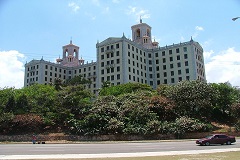The effectiveness variables for the hotel sector of the Cuban city
Keywords:
effectiveness, variables, hotel sectorAbstract
The effectiveness of the Cuban tourism sector is of great importance for compliance with the strategic plan for national development, boosting the economy and generating foreign currency. In this context, the objective of the present study was to determine the main variables for the evaluation of the effectiveness for the hotel sector of the Cuban city with a strategic approach. The applied methodology corresponds to a mixed, non-experimental approach research, where content analysis techniques, experts and strategic prospective were applied. As a result, twelve variables were determined, nine of them strategic variables and the tourist variable as the riskiest. It is concluded that the methodological proposal made allowed the definition of variables with a sectoral approach, contextualized to the particularities and development trends of the sector as a step prior to the design of indicators.
References
Cuesta, A. (2005). Tecnología de Gestión de Recursos Humanos. La Habana: Ed: Academia
Diaz-Canel, M. (2022). Ministerio de Turismo. https://www.mintur.gob.cu/diaz-canel-insiste-en-la-importancia-del-turismo-para-la-economia-cubana/
Díaz, A. (2020). Los actores de la distribución comercial en turismo y viajes. GDS y CRS. Mitos y realidades. Revista Caribeña de Ciencias Sociales, (1),. https://EconPapers.repec.org/RePEc:erv:rccsrc:y:2020:i:2020-01:31
Ferreiro, Y. (2022). Diagnóstico de los hoteles de ciudad en Camaguey. Universidad de Camaguey: Archivo del investigador.
Ferreiro, Y., Fernández, A., y Gil, M. (2023). La efectividad en el sector hotelero. Una aproximación conceptual. Retos De La Dirección, 17(1), e23107. http://scielo.sld.cu/scielo.php?script=sci_arttext&pid=S2306-91552023000100007&lng=es&tlng=es.
Flores, E.N.; Ochoa, F.J. y Arroyo. F.J. (2018) Análisis de la Situación de la Industria Hotelera. Vinculategica. 3(36). 323-334. http://www.web.facpya.uanl.mx/Vinculategica/Vinculategica_3/36%20FLORES_OCHOA_ARROYO.pdf
Godet, M., & Durance, P. (2007). Prospectiva Estratégica: problemas y métodos. Cuadernos de LIPSOR, 104 (20). San Sebastián, España: SPEKTIKER
MINTUR (2006). Manual para el Análisis de la Actividad Hotelera. La Habana: Grupo Hotelero de Ciudad “E”.
Monsalve, C., y Hernández, S. I. (2015). Gestión de la calidad del servicio en la hotelería como elemento clave en el desarrollo de destinos turísticos sostenibles: Caso Bucaramanga. Escuela de Administración de Negocios, (78), 162-173. http://www.redalyc.org/artículo.oa?id=20640430011
Ortiz, P. S.; Reyna, J. P; Villarruel, G (2020). Desempeño laboral: Una revisión sistemática de su desarrollo en el sector hotelero en Latinoamérica. (Tesis de Grado). Lima: Universidad Peruana Unión. https://repositorio.upeu.edu.pe/bitstream/handle/20.500.12840/3943/Pablo_Trabajo_Bachiller_2020.pdf?sequence=1&isAllowed=y
PCC (2021). Lineamientos de la política económica y social del partido y la Revolución para el periodo de 2021-2026. https://siteal.iiep.unesco.org/sites/default/files/sit_accion_files/cuba_conceptos_y_lineamientos_2021_2026.pdf

Downloads
Published
How to Cite
Issue
Section
License
Copyright (c) 2023 Yusniel Ferreiro Martínez, Ana Fernández Andrés, María Saturnina Gil Basulto

This work is licensed under a Creative Commons Attribution-NonCommercial-NoDerivatives 4.0 International License.
- Sending a contribution to the Cuban Magazine of Finance and Prices (RCFP) implies a non-exclusive assignment of rights, which includes: Reproduce the Article in whole or in part and communicate the Article to the public in print or electronic format, combined or not with the works of third parties, such as by making the Article available to the public via the Internet or any other network, as part of a database, with on-line or off-line access, for use by third parties; Translate the Article into other languages and release the translation to the public; Create adaptations, summaries, or excerpts of the Article and other derivative works thereof, and exercise all of your rights in such adaptations, summaries, excerpts, and derivative works; Include the Article, either in its translated, adapted or summarized version, totally or partially, in a computerized database and make it available to third parties; Include the Article, totally or partially, either in its translated, adapted or summarized version, in a selection or compilation of texts; Rent or lend the Item to third parties; Reproduce the Article by means of reprography, without prejudice to legal limitations.
The Author of articles published in the Cuban Magazine of Finance and Prices (RCFP) may exercise the following rights:
- Reproduce the Article, totally or partially, and disseminate its content or make it available to the public, in printed or electronic format, as part of a teaching content or as a compilation, for use in the academic or research field in the institution to the one to which the Author belongs or in those institutions to which he belongs.
- Publish the Article on the Internet or authorize the Author's institution (or any other appropriate organization) to do the same, immediately from the date of publication of the Article in the journal: within the institution's closed network (p. eg, the intranet); or in publicly accessible institutional repositories or centrally organized repositories, provided that a link to the Article is included on the journal's website.
- Grant to the Author's own institution (or any other appropriate organization) the authorization to reproduce the Article in order to prevent its deterioration or, if the original is in an obsolete format or the technology to use it is not available, in order to ensure that the Article remains available for teaching or research purposes;
- Present the Article at a meeting or conference, and distribute copies of the Article to those attending the event.
- Grant end users at the Author's own institution (or any other appropriate organization) permission to copy, use, transmit, and publicly perform the work and to create and distribute derivative works.



